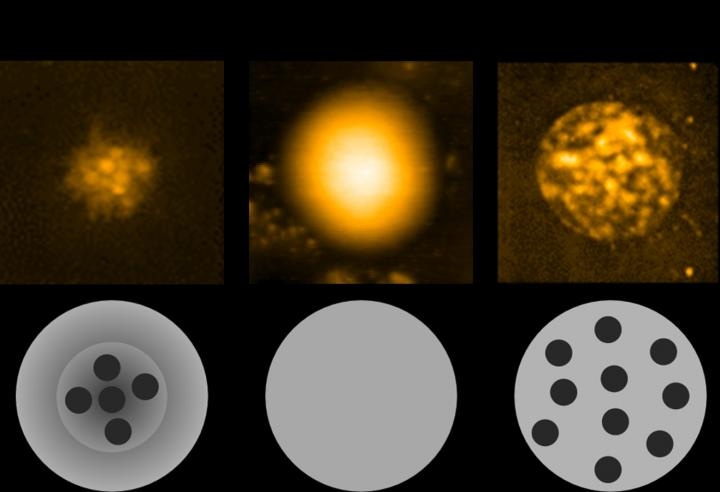May 31 2019
Scientists at Shinshu University have succeeded in recording earlier unsolved behavior of hydrogel microspheres (microgels) with the help of a newly tailored tool: the temperature-controlled high-speed atomic force microscopy (TC HS AFM).
 TC HS AFM analysis of microgels synthesized by different polymerization techniques: (left) precipitation polymerization, (center) inverse miniemulsion polymerization below the VPTT, and (right) inverse miniemulsion polymetization above the VPTT. Credit: Nishizawa et al., Angewandte Chemie International Edition, 2019, Copyright Wiley-VCH Verlag GmbH & Co. KGaA
TC HS AFM analysis of microgels synthesized by different polymerization techniques: (left) precipitation polymerization, (center) inverse miniemulsion polymerization below the VPTT, and (right) inverse miniemulsion polymetization above the VPTT. Credit: Nishizawa et al., Angewandte Chemie International Edition, 2019, Copyright Wiley-VCH Verlag GmbH & Co. KGaA
This tool, which is the first-of-its-kind, had been created by Dr Takayuki Uchihashi of Nagoya University to study proteins. For the first time, it was applied to the research of microgels by the research group at Daisuke Suzuki Laboratory, Graduate School of Textile Science & Technology and RISM (Research Initiative for Supra-Materials) of Shinshu University.
The research headed by first-year doctoral candidate, Yuichiro Nishizawa, has successfully examined the structure of the microgels, which had been challenging because of restrictions of earlier equipment.
The structure of microgels has been investigated comprehensively using scattering and imaging methods such as fluorescence microscopy, electron microscopy, super-resolution microscopy, and atomic force microscopy. Using such methods, the thermoresponsive properties of the core-shell structures had been well documented. With TC HS AFM, they could see and record the particles comprehensively—non-thermoresponsive inhomogeneous decanano-scale spherical domains—which had been hypothesized by Dr Kenji Urayama of the Kyoto Institute of Technology.
As our research indicated, hydrogel microspheres have heterogeneous structure in almost every case. Moreover, the heterogeneous nano structure would have an impact on the physicochemical properties of water swollen microgels and would lead to a gap between theory and result. We believe that our findings can contribute to the understanding of these gaps.
Yuichiro Nishizawa, First Year Doctoral Candidate, Shinshu University
The Shinshu University group first investigated the microgels produced by precipitation polymerization. This gel possesses the core-shell structure and the non-thermoresponsive spherical domains. With inverse miniemulsion polymerization methods, they could synthesize two more kinds of microgels earlier assumed to be the same but were found to behave in a different way.
Microgels developed by inverse miniemulsion polymerization below the VPTT synthesized a gel without the non-thermoresponsive domain as well as without classic core-shell structure. It was uniformly homogenous. A third technique that used the inverse miniemulsion polymerization above the VPTT synthesized an inhomogeneous gel without core-shell structure, but it had the nano- to submicron-sized non-thermoresponsive domains. The Shinshu team was able to demonstrate that the method of production significantly influences the differences in the structure and thus the behavior of the three types of microgels.
This work offers insight into all thermoresponsive microgels and perhaps other stimuli-responsive colloids. The understanding that the technique of production greatly affects the structure will help create real-world applications such as microgel glass/crystal and other medical materials. The Shinshu team anticipates continuing the study of hydrogel microspheres. Nishizawa states, “ultimately, we want to develop new types of microspheres which improve people's standard of living.”